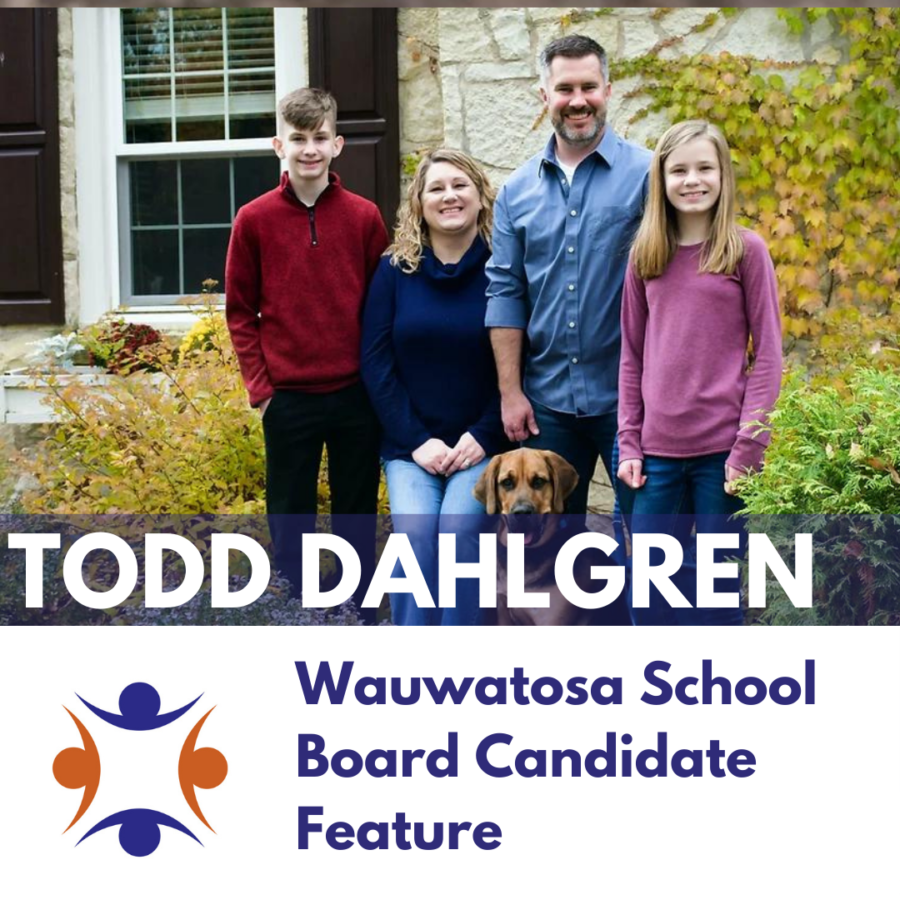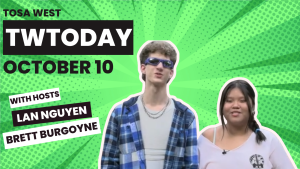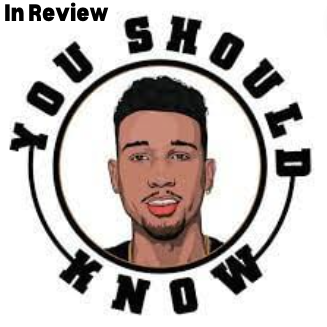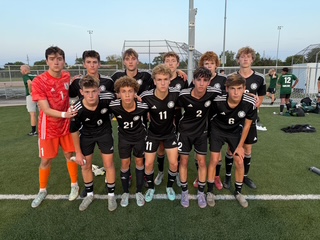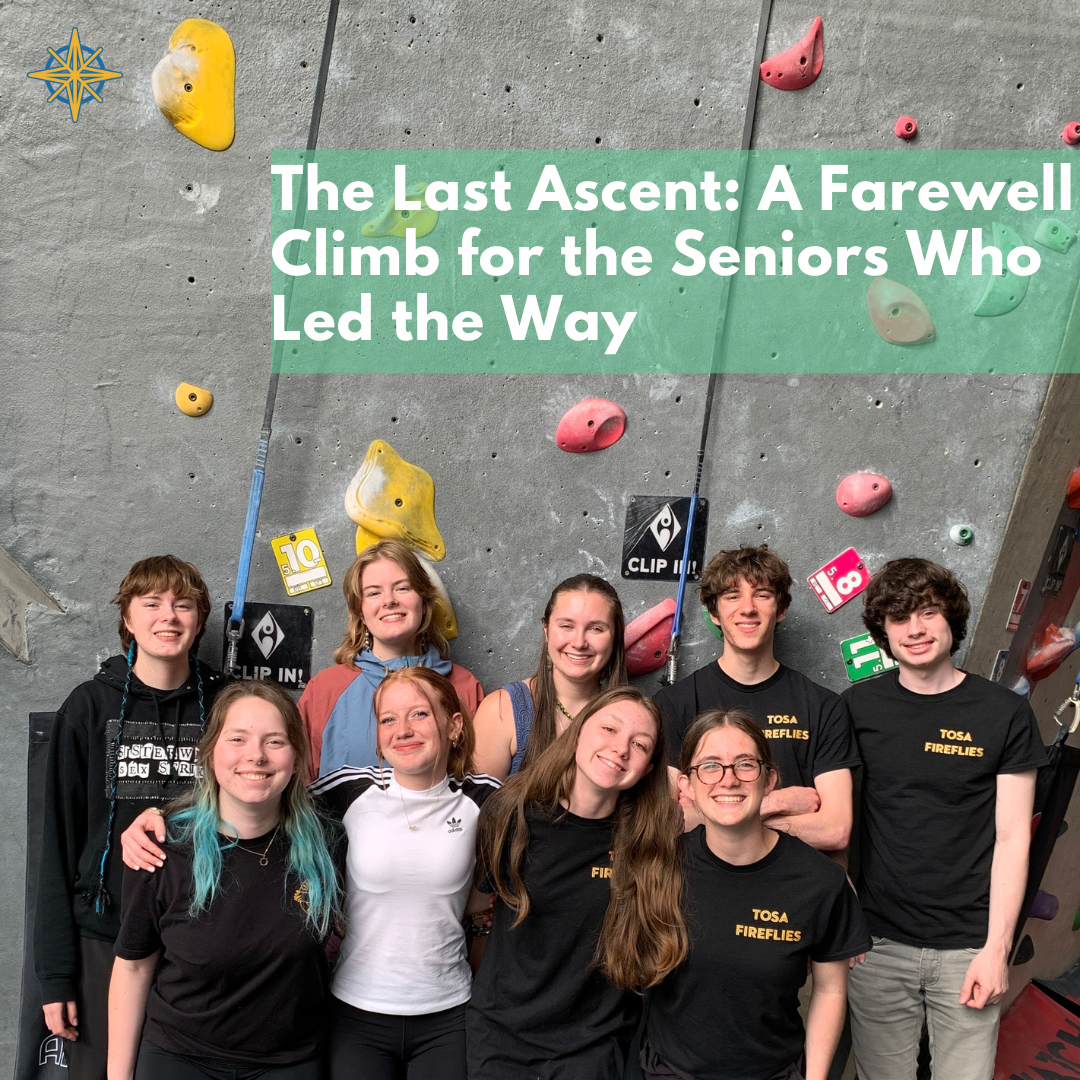School Board Candidate Feature: Todd Dahlgren
March 23, 2022
Todd Dahlgren is running for seat 3 on the Wauwatosa School Board this year. He works as an engineer and has two kids in the district. His top priorities if elected are student engagement, preventing a toxic workplace, and more support for special education.
Why are you running?
I’ve lived in Wauwatosa for almost 19 years. I have two kids in the district, and I’m running for school board because I see the importance of an education for everybody. I see what education has done for my wife and I, in the life we’ve been able to provide for our kids. Public education is in the interest of society as a whole whether you have a kid in school or not. We need every single member of society to be able to make a contribution with whatever skills they have for a career. We need people who can problem solve, people who can communicate effectively. And that’s how you make the world a better place.
What do you think that you bring to the school board?
So what I would bring in my career as an engineer is that I do a lot of analysis and problem solving. That’s the mindset I believe I would bring to the board. There’s a lot of great things going on in the schools, but there’s also a lot of problems that need to be addressed. One of the significant problems that I see is student engagement. I spent the day at West in January in a couple of classrooms. I see student engagement as a significant issue. And I don’t think that’s unique to Wauwatosa. But I can only speak to all of Tosa, I think if we can get a lot more kids more engaged in their education, that’ll lift a lot of kids up and put them on a path to whatever career they want to choose.
What steps would you want the School Board to take in order to promote student engagement?
I think what it comes down to is that the board provides governance for the school district. So we’re essentially the boss of the superintendent. And the school board in cooperation and collaboration with the superintendent, develops a plan for how the district is going to meet the goals that are reflected by the community. And so as a school board member, I would communicate to Dr. Means how critical I think student engagement is and then you direct staff, administrators to take steps to really make that a focus. I think some teachers do a great job at it. I saw that when I spent the day at West. But I don’t think that’s always enough. Teachers have a lot on their plates these days. And there’s maybe some things that could be taken off their plates. There’s issues of student discipline, and there’s a connection between student discipline and responsibility and engagement. Because if you’ve got a class of 25 kids, and there’s three or four who are regular disruptors in the class, not only are those kids not engaged, they’re adversely affecting the engagement of everybody else in the class. And so it’s not as simple as just saying, Well, hey, kids become more engaged. There’s other things you can do in the classroom environment that will improve engagement without making it a direct focus.
So what are those things in the classroom?
I think some of it goes to, again, allowing teachers to have the time to do it. Some of it goes to issues with that student and what their home life is like. I spoke with Dr.Means, and he’s had conversations with some families about student discipline. And it’s really disappointing to hear that his feedback is that some families are kind of hostile towards him when he starts talking about discipline of their kids. I don’t claim to be an expert on school engagement. But there are people who can be school psychologists, social workers, teachers, administrators. I’m not going to say that I have a solution to every problem. But I have a set of priorities based on observations I’ve made. And those are the priorities that I’m going to push for.
What are your other top priorities?
Organizational culture is a big priority. For far too long there’s been a toxic work culture in the district. Teachers haven’t felt that they’ve been empowered to speak honestly to administrators about problems that they see. And sometimes when they do, there’s retribution against them, they’ve been punished. Essentially, speaking up honestly about what they think that needs to change. Teachers are the frontline workers in our education environment. They see what works, they see what doesn’t, and they need to be able to provide honest feedback, so that when you have a course of action to meet the goals of the district, you can make course corrections over time to make tangible progress towards goals.
My other priority is special education. I spoke with some families who have children in special education in the district. There was a special education audit that was recently conducted. Dr. Means commissioned and it was emailed out to district families earlier this week. There’s a lot of problems and I respect Dr.Means for saying hey, let’s focus on how we can make things better. And I wholeheartedly agree we need to make things better. But when you read through that audit, there’s a lot of troubling things. You get the impression that the service delivery model for the district is simple but as symbolism, essentially a ship adrift at sea with no pilot, and that is extremely troubling. It’s because the direct impact is on students and families. And so I would advocate for a special committee of the school board for special education that would have school board members on it. It would have staff on it, administrators on it, and families on it, because there’s special education families who brought fantastic ideas to this school district for several years now and they’ve been ignored. And that’s the brutal truth. They’ve been ignored in the interest of self preservation by the district.
How will you talk more to the district and teachers about this issue, and make changes?
I would say not talking nearly as much as listening. I think there’s a lot of people who probably have some great ideas, and nobody has a monopoly on good ideas. I’m not going to say that I have the solution to every single problem for Wauwatosa schools, but I’m going to be willing to listen to anyone who wants to have a good faith discussion about education with me. I’m open to it. I’ve had plenty of conversations like the ones we’re having right now with teachers and parents, some of whom I agree with on things. Some of them I disagree with and some of them I take away from that conversation, learning some things that I didn’t know about, and that’s really what needs to happen. I think there’s a majority of the current school board that has their idea of what should happen, and if someone from the community disagrees with them, well, then that person was just dismissed. And that’s not the way it should be.
Is there a specific set of steps that you want the school board to take to mitigate the toxic workplace culture?
Really, what it comes down to is just the School Board communicating the data, and saying that the previous culture that existed is not acceptable. And holding Dr. Means accountable for providing a district culture that says that administrators, building principals, I want you to have an open mind when talking to staff. And if the Board of Education and myself start hearing things where that’s not happening, that’s going to be a problem. Because again, the seven numbers of the school board are essentially the boss of the superintendent. Now as a school board member, I can’t be in every school saying, hey, principals, listen to your teachers. Again, that’s the role of the school board is oversight and governance of the school district and it’s communicating effectively to the administration, what the expectations are.
How do you think that the school board in the past has been good at communicating things?
The school board’s job isn’t necessarily to communicate the day to day things of the school district. That’s on the school district communication employees. The school board communicates through their meetings, through the dialogues they have on the various topics that are presented to them. It’s through taking in public comments, and it was really frustrating and disappointing to see at the February 14 board meeting that Board President Steve Dolman completely unannounced changed the format of the meeting. To reduce public comment. And there was some contentious back and forth at that meeting, where one board member in particular questioned that they haven’t talked about this and Mr. Dolman said they did. Well, that conversation happened back in September. And to take something that happened in a meeting the board meeting in September in what the public wasn’t attending, and then five months later on the fly, say, Hey, we’re changing and there’s no more public comment after individual topics, without any notice without any gain engagement in the community. That’s a problem. Now state law permits him to do that. State law is pretty open as far as how a school board conducts their meetings. But there’s a right way to do things and there’s a wrong way to do things. And when the school board is the community’s representation for how the community wants the school district to be operated to then just unilaterally unannounced, reduce public comment. That’s just not an effective way to communicate with the community.
What have you advocated for in the past weeks at the school board meetings?
When I attend school board meetings, I haven’t been as vocal as some other members throughout some things I have advocated for. Last August, I was one of some parents, maybe a dozen that advocated against vaccination status being checked for parents. It became apparent that with the new reentry plan for last fall, that vaccination status was going to be checked for any parent volunteer or any speaker going into a school. And I didn’t think that was right. I thought there were legal problems with it and so I emailed the board and Dr. Means to say if they’re not going to be requiring teachers to be vaccinated, they can’t require members of the public to be vaccinated to come into school. That’s an equal rights issue. So that was one thing I advocated on the board, and Dr. Means ended up agreeing with my position. They changed the policy so that vaccination status was not going to be required for someone from the community to come into the school being a parent volunteer, or a speaker in a class, that sort of thing. At the start of the school year, I advocated for a mask optional policy. When the omnicron variant became much more prevalent around the holiday time I advocated for masking in the buildings. I was critical of the board and the previous administration on AVID and how it was implemented. And as a citizen that was really really disappointing because I see the benefit that AVID had with some students. And I think that if it had been implemented correctly, we could still have it for those students who need it. I don’t think it was necessary to implement district wide the way Dr. Ertell wanted to but it was also disappointing to hear that the plan was for AVID to be implemented district wide, yet most of the elementary school staff didn’t know anything about it, and it was like a year away. That’s a significant communication issue that existed with the previous administration when your staff don’t even have an idea of key initiatives that are coming down the road. So I had advocated for a thorough review of what happened with the AVID implementation. And then at one of the November board meetings, I advocated for keeping the AVID 12 elective because when families enter East or West High School, and were identified as having students that met the criteria for AVID, those families were promised that this elective will be available throughout their high school career. Maintaining that promise was important to me, even though I was extremely disappointed with how AVID is implemented, but I thought that the AVID 12 electives should be maintained. Going forward for those families who are already in the system and then slowly phase it out. Now, Dr. Means and the Board of Education disagreed they thought, well, we just need to make a clean break and move away from it. And we’ll try to utilize staff expertise to implement something similar, and that’s fine. I was concerned about putting more things on the plate of staff to do that. But you know, as a minimum, as a member of the public you make an appeal for a position. Sometimes the board agrees with it and sometimes the board doesn’t.
How would you assess the school board’s handling of the COVID-19 pandemic?
I appreciate their efforts and the time that they put into it. I disagree with some of the things that they did. I agreed with their policy to start the 2020 school year in hybrid. I thought that was the responsible thing to do. But it became apparent a few months later that other neighboring districts that took a more risky position with regards to in person learning weren’t having significant differences in terms of infection rates and that sort of thing. My position pivoted and I thought we needed to get students in full time. So it was frustrating to see how the board went about making that decision. I thought it was ridiculous that the administration would provide a plan to get students back in person, and then some board members would offer amendment after amendment after amendment and the board meetings would go until midnight, two o’clock in the morning. It was just ridiculous. It was unnecessary. And some board members didn’t want our kids to go back full time until April of last year, which I thought was ridiculous. Additionally, there’s a board policy that allows the superintendent to manage significant incidents of infectious disease somewhat unilaterally. The board can provide input but it seems to me that the board really tried to micromanage the district’s response to COVID when the board could have been conducting more oversight of data at the time. Dr. Means at one of the February board meetings did present to the board about the policy. He wanted approval to take more control of how the district regulates COVID. I think that’s the responsible thing to do. If you think of the school district as a corporation, the superintendent is essentially the chief executive officer. And in any business, the Board of Directors doesn’t dictate day to day operations of an organization. It’s the responsibility to CEO to do those things, and it’s the responsibility of a board of directors to maintain oversight, provide feedback. And for what resources are needed, that sort of thing. So that’s if I had been on the board that’s how I would have done things a little differently.
What would you do to facilitate those respectful conversations as well as take into account people who you represent whose opinions are different from yours?
I would say it’s who I am. I’ve had conversations with people who I don’t necessarily agree with. But I respect their opinions. In listening to some of the board meetings teachers would call in and parents would call in advocating for their position and it was really hard to hear some of the stories about why they felt the mask mandate was needed or vaccination was needed. Ultimately the board has to be responsible for the education of every student in the district. And sometimes that means you as a parent or you as a family aren’t going to get exactly what you want for your child. And that goes both ways. Really what it comes down to, again, is having educated, respectful discussions. Sometimes just saying, I agree, we’re just gonna have to agree to disagree. But it doesn’t have to be contentious and as long as both people are willing to come and have that discussion, and be respectful of each other. And realize that there’s no perfect answer. There really isn’t. There’s some things in the world that are black and white, but a lot of the world is gray. Various tones of gray. And sometimes you just have to come up with a solution. That’s not going to make everybody happy. It’s not going to satisfy everybody, but it’s in the best interest of the community as a whole. And that’s what you try to strive for.
In your opinion, what has the school board done well?
They’re fantastic advocates for kids and schools, and I have great respect for the amount of time that they put into the job. I just disagree with some of the decisions they’ve reached on some topics. They’ve done well in providing different opportunities for students, whether it’s in the arts, whether it’s extracurricular activities, whether it’s athletics. If the student is genuinely interested in their education in Wauwatosa, that student has every opportunity to succeed and go on to pursue whatever they want to pursue. And this current board has done well in facilitating that.
What would you do to make sure that students are being listened to and achieving the goals that they want?
It really comes down to just having an open mind. I think it’s a good idea that the school board implemented the students’ seats on the board, that allows them to provide a little window into what it’s like for the students. So I would certainly encourage that to keep happening. Sometimes, and again, this isn’t unique to kids, goes with adults, too. Sometimes someone advocates for a position and you just say, I disagree and that’s part of what elections are for. I’m running for school board to be elected to the board and people will disagree with me.
Do you have any thoughts on the use of the ESSER funds?
I’m in agreement with the plan that Dr. Means put forth. It was a plan that was developed in coordination with what staff saw as needs. I think adding academic specialists, behavior specialists, more mental health specialists will help. What’s critical is what Dr. Means identified is that when those positions are added, there needs to be a mechanism to measure the success of those extra funds. It’s a fixed amount of money that has to be spent in a fixed amount of time and then after that the money is gone. So it’s not an ongoing trail of money that’s going to come to keep funding those positions. So at the end of the two years, if we don’t measure the success of those positions effectively, we have to find another way to pay for them. So I applaud Dr. Means saying yes, we’re going to do this. We also need to implement a system to track what works, what doesn’t, and then going forward in two years reassessing budget priorities to say, Okay, this worked. Now we need to figure out how to pay for it on an ongoing basis by understanding what hasn’t been working, and that’s where we start moving dollars around. The budget needs to be a dynamic document from year to year. That takes into consideration what works, what doesn’t, and then adjust priorities based on that. So on the whole, I agree with the plan that Dr. Means is looking to implement and again, if I’m elected to the Board two years from now, I would be asking questions. With this plan that we implemented two years ago, what worked and what didn’t? What are we going to keep going with? What are we not going to keep going with? And how do we pay for it?
Is there anything else that you’d like to say?
I’ve been humbled by how many people have gotten behind me and supported my campaign to get elected on the school board. I’ve met a lot of great people. I’m a little bit of an introvert. So meeting new people isn’t something that I’ve always been uncomfortable with. It’s more comfortable in a setting like this just talking with a couple of people versus a large setting so it’s been a great opportunity to hear from people and meet new people. If I’m elected, I truly want what’s best for the community, what’s best for the district, and I want every student to have an opportunity to pursue whatever they want to pursue going forward as they become young adults. And that’s what I would always have in my mind as far as how that’s the goal we need to reach, that every student receives the education that they need to go into a 21st Century global economy with skills behind them that will offer them the opportunity to make a contribution.



